ZAMBOANGA DEL SUR | What to See and Do in Zamboanga City
Sunday, November 04, 2018
A destination is better enjoyed the second time around, especially if your first visit only lasted for a mere ten hours. It has been more than four years since I’ve last been to Zamboanga City, and on this subsequent outing, the city seemed unchanged, it’s still as vibrant as when I’ve first laid eyes on it. This time, I’m definitely spending more than a day at the city, in fact, we’re here for a total of five days. Perfect for seeing all the tourist spots in Zamboanga!
 |
| FORT PILAR, A MASSIVE FORTIFICATION LEFT BY THE SPANIARDS IN ZAMBOANGA CITY |
Dubbed as Asia’s Latin City, Zamboanga City is one of the major bastions of the Spanish conquistadors during the Spanish Colonial Era in the Philippines. Traces of this can still be found on the city’s architecture, the people’s chavacano language—a type of Spanish creole, their cuisine, faith, and way of life. The people of Zamboanga City are as diverse as the colors of their vinta boats, here Christians and Muslims—from the people of Yakan and Samal, to Tausug, and Badjao—coexists without friction.
| WHAT TO SEE AND DO IN ZAMBOANGA CITY WHAT’S INSIDE? • Walking Tour • Bird Watching • Pasonanca Park • Yakan Weaving Village • Canelar Barter Trade Center • Santa Cruz Island • Once Islas • Food Trip • Zamboanga Hermosa Festival ► ZAMBOANGA TRAVEL GUIDE |
 |
| YOU’LL LOVE ZAMBOANGA CITY TOO! |
But, is it safe to visit Zamboanga City? From my personal experience, I find the city to be extremely peaceful. It looks and feels like any other developing cities outside of Metro Manila—granted, the presence of military personnel on the roadways. One of my companions, K of Tara Lets Anywhere even compared it to to the chill vibe of Dumaguete. Zamboanga City is one of the safest places you can visit in Mindanao, and you can even tour it DIY! For a hassle-free experience, however, we opted for one of the accredited tour operators in the city, iTravel Tourist Lane.
WALKING TOUR
One of the best ways to see Zamboanga City is by walking. We started from the Shrine of the Nuestra Señora La Virgen del Pilar de Zaragoza on one of the old walls of Fort Pilar, the stronghold of Spain in Mindanao back then, then proceeded to the pigeon-littered street of Valderosa, where stalls selling religious items and street food, like the sweet martillos wafers abound. It’s interesting to note that the Muslims of Zamboanga City also venerate the image of the virgin, and while the faithful lit candles along the shrine, my friends took photos of themselves while running through the flocks of pigeons along the road. Right across it is the Museo de Zamboanga, and like my first visit, it is unfortunately closed again.
 |
| THE SHRINE OF THE MIRACULOUS NUESTRA SENORA LA VIRGEN DEL PILAR DE ZARAGOZA |
We proceeded through the busy roads of the city, checking out the carbon-dated age posted on the massive rain trees lining its sidewalks. Looking for the oldest one, we found one all the way from 1859. This tree was already here when the Spanish walked these lands.
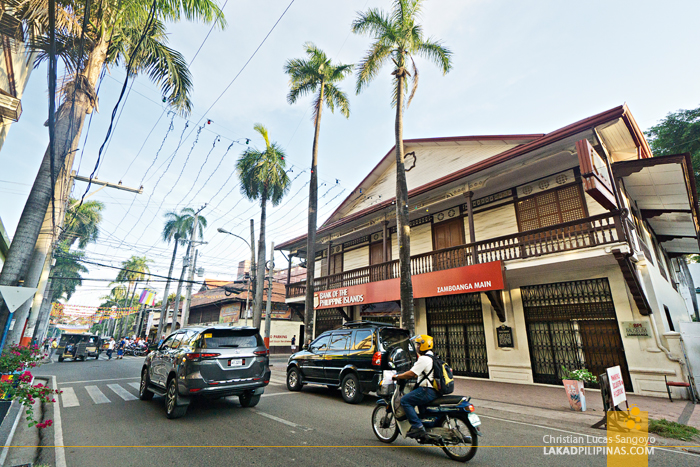 |
| HERITAGE STRUCTURES IN ZAMBOANGA CITY |
Along the way, we passed a few heritage structures—ancestral houses still home to native Zamboangeños, olden Art Deco-ish buildings converted into commercial space for the likes of, guess what, McDonald’s, until we reached the century-old Zamboanga City Hall, where not unexpectedly, an I❤ZC stands proudly along the sidewalk.
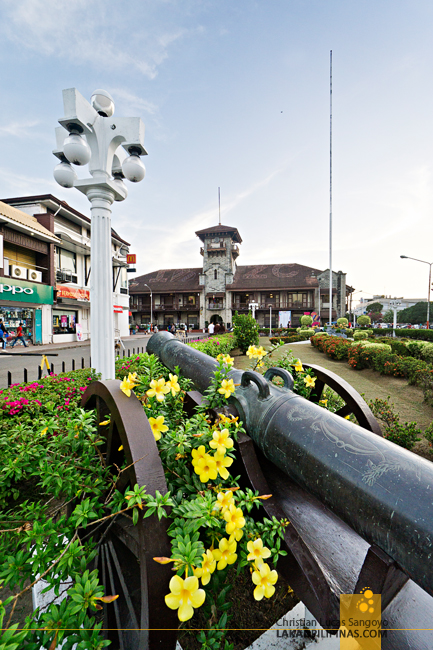 |
| THE ZAMBOANGA CITY HALL AS SEEN FROM RIZAL PLAZA |
We ended our historic walk at the Plaza Rizal in front of the City Hall where our National Hero stands watch over the heart of the city. We were told that the cannons and the intricate concrete lamp posts along its grounds were legit; the former were remnants from Fort Pilar, while the latter were from when the Americans took over Zamboanga City after Spain sold the Philippines to Uncle Sam.
 |
| PLAZA RIZAL AT THE HEART OF ZAMBOANGA CITY |
BIRD WATCHING
A few minutes away from Fort Pilar is the ZSCMST Bird Sanctuary. It’s quite jarring and unexpected to see a wetland right in the heart of Zamboanga City. It is a refreshing sight amidst the concrete goings-on of the city. ZSCMST stands for Zamboanga State College of Marine Sciences and Technology, and this small marsh is actually inside its campus. The area is a stop-over for migratory birds. I mostly saw egrets, similar to those I saw at the Candaba Swamp in Pampanga, chilling out on tree branches, talking about a good place to have satti, perhaps. It is open to the public, you just need to log at the campus gate.
 |
| VIEWING PLATFORM AT THE ZSCMST BIRD SANCTUARY |
 |
| ONE OF THE MANY MIGRATORY EGRETS AT THE SANCTUARY |
PASONANCA PARK
About seven kilometers north from Fort Pilar, right along the fringes of Zamboanga City, is the Pasonanca Park. Built by the Americans, the park has three public swimming pools with water naturally flowing over it, an aviary, a zoo, a flower garden, a butterfly park, and the iconic Zamboanga Tree House—a place you can actually spend a night in. Within the vicinity is Camp Limbaga, the place where boy scouting in Mindanao first started, and the El Museo de Zamboanga—a good place as any to brush up on your Zamboanga history, complete with artifacts and dioramas.
 |
| THE ZAMBOANGA TREE HOUSE, A WELL-KNOWN TOURIST SPOT IN ZAMBOANGA CITY |
 |
| INSPECTING A CANNON AT EL MUSEO DE ZAMBOANGA |
 |
| BOY SCOUT HUTS AT CAMP LIMBAGA |
YAKAN WEAVING VILLAGE
If you’re into weaving and native products, then the Yakan Village at the west side of Zamboanga City is a must visit. As with its name, this place is literally a village populated by the Yakan people—Muslims who migrated here from Basilan during the seventies. Along with their things, they brought their culture of hand-weaving colorful fabrics used for their traditional dresses called semmek. But with the advent of tourism in the city, they have since upped the ante by producing bags, table runners, and even shoes made with from their weavings. What I’m looking for, though, is a camera strap, lol. Their colorful designs, which can take weeks to finish, are patterned after nature—rainbows, animals, and plants.
 |
| YAKAN WEAVING VILLAGE IN ZAMBOANGA CITY |
 |
| THREADS FOR WEAVING |
 |
| SOME OF THESE CAN TAKE WEEKS TO PRODUCE |
CANELAR BARTER TRADE CENTER
Right on the same alley, but on a more commercial side, is the Canelar Barter. Bring lots of eco bags when you go as you certainly won’t go back empty handed. The market, is literally a barter or trading place for Malaysian and Indonesian products coming in from the country’s backdoor. Inside what seems like a rundown factory is an explosion of colors and flavors. You can buy anything from sarongs, batik shirts and dresses, bags, hats, and scarves, to mie goreng instant noodles and Malaysian white coffee.
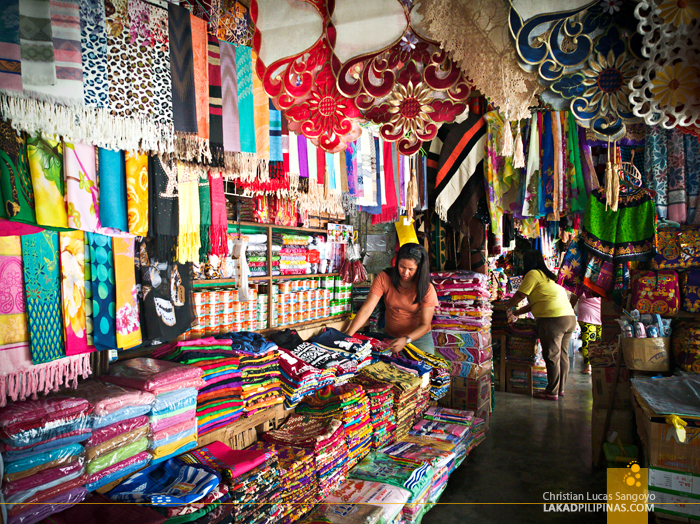 |
| SHOPPING FOR PASALUBONG AT THE CANELAR BARTER |
 |
| TAKE YOUR PICK! |
SANTA CRUZ ISLAND
After you’ve set shopping out of your mind, then it’s time to hit the beach! And the most accessible place to head to is Sta. Cruz Island. Famed for its pink beach, due to crushed red corals that mix with the sand, the island is less than half an hour by boat from the city. I haven’ actually been there yet, but I’ve seen a similar pink beach at Subic Beach in Bicol and Komodo Islands in Indonesia, and it’s just surreal!
 |
| STA. CRUZ ISLAND FROM ABOVE ~ PHOTO BY TRAVEL TRILOGY |
 |
| WHAT MAKES STA. CRUZ ISLAND PINK? ~ PHOTO BY BLISSFULGURO |
ONCE ISLAS
And if you’re hankering for more beach action, then there’s Once Islas for you. Located an hour away from the city center, four of the eleven islets along Barangay Panubigan and Dita has recently opened to the public. I’m not shy to use to term pristine to these islands, as they are indeed, pristine—and local officials are making sure it stays that way. Read more about it here: Once Islas Zamboanga
 |
| THE NEWLY OPENED TOURIST SPOT IN ZAMBOANGA, ONCE ISLAS |
FOOD TRIP
One of the things that surprised me about Zamboanga City is its food. The variety of cuisine and dishes in the city is just overwhelming! Everything from the delectable semi-lobster semi-crab curacha lathered with alavar sauce and crispy pork lechons, to their mundane street food! Heck, I even saw local eateries hawking Malaysian dishes like mee goring and roti canai, which I dearly love. Everything is just so good! I can actually go back to Zamboanga just to eat and fatten up.
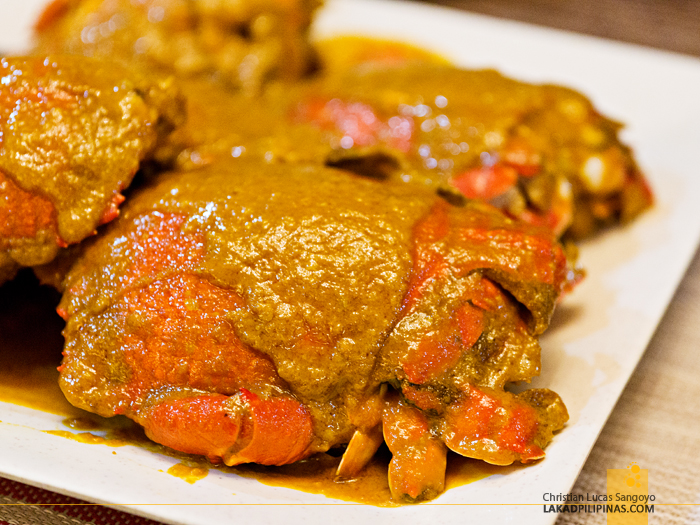 |
| CURACHA LATHERED IN ALAVAR SAUCE |
 |
| SATE, A TYPICAL BREAKFAST MEAL IN ZAMBOANGA CITY |
 |
| A LOCAL ROASTING A LECHON |
ZAMBOANGA HERMOSA FESTIVAL
If ever your visit falls on the month of October, then you’ll be lucky to catch the Zamboanga Hermosa Festival, a fiesta about the city’s faith and traditions. Watch colorful vinta boats race across the sea, Zamboangeñas strut out colorful mascota dresses, and kids dance to the beat of the drums across the city streets. It is a delightful menagerie of colors interspersed with local customs, and of course, lots of eating!
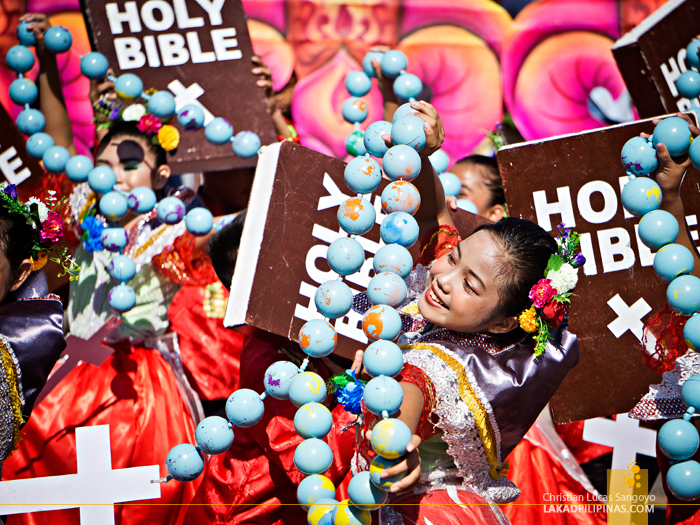 |
| ZAMBOANGA HERMOSA FESTIVAL |

iTravel Tourist Lane
Address: Mayor Jaldon St., Canelar, Zamboanga City
Contact Number: +63 (917) 722-6410, +63 (939) 445-6290, +63 (917) 392-9474
Facebook | Website | Twitter | Instagram

























































0 comments